Cuba’s Old Movie Theaters Make Delightful Destinations
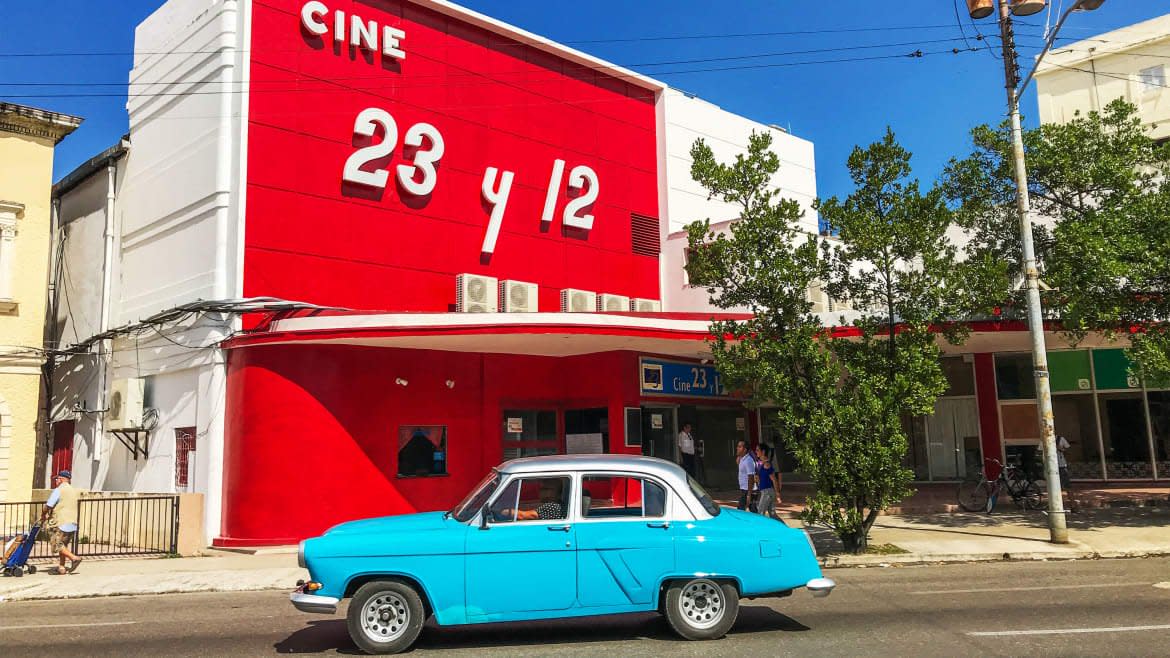
Cuba is full of white sand beaches with crystal clear water, mazes of Instagrammable architecture set behind Cuba’s quintessential classic cars, and countless performance venues full of world class musicians and dancers. Why on earth would anyone spend their Caribbean vacation sitting in a dark, old movie theater? Allow me to make my case.
I first visited Cuba in 2013 and have returned more times than I can count, including several multi-month visits that afforded me the time to go beyond the typical tourist attractions. While WiFi access in Cuba is rapidly improving, this wasn’t the case during my first few visits. I enjoyed six weeks of Internet-free travel, something that’s becoming harder and harder to achieve. What does one do when they can’t spend their afternoon broadcasting themselves living their best life on social media? They go to the movies.
During a three-month hitchhiking road trip across Cuba in 2016, I visited many small towns where there wasn't much to do. After a week in the small city of Bayamo, I asked local friends for suggestions. They suggested I revisit the three museums I had visited a few days previously. Mind you, these were not the massive history and science museums you find in New York City or Washington, D.C., where one could easily spend a week in a single museum. So, instead of revisiting Baymo’s small museums, each of which could be fully explored in 45 minutes, I headed to the local movie theater.
During Cuba’s Special Period, a time of deprivation following the collapse of the Soviet Union, many cinemas closed due to lack of funding, so the state opened small “video rooms” to screen movies on VHS. Many of these video rooms still exist in small cities and rural areas that lack a proper cinema, though they’ve upgraded to screening movies on DVD.
Clandestina Is Cuba’s First Independent Fashion Label. Its Founders Want ‘Global Domination.’
Though Bayamo doesn't see a lot of tourism, the city boasts two movie theaters, which is not uncommon in small Cuban cities. Bayamo has one large, traditional movie theater and one “video room,” a smaller theater with two bedroom-size rooms with flat-screen TVs. It was here that I joined local middle-aged and retired men for weekly Bruce Lee films on "Kung Fu Tuesdays.” After an afternoon kung fu matinee, I'd walk down the block to the main cinema to catch a Cuban-made film from the ’80s. Last year, I saw The Dark Tower, a 2017 American fantasy film, in Bayamo's main theater. The video-room theater still exists and they also still rent DVDs and VHS tapes (another throwback). However, much to my dismay, they've abandoned Kung Fu Tuesdays, as the locals seem to have tired of it.
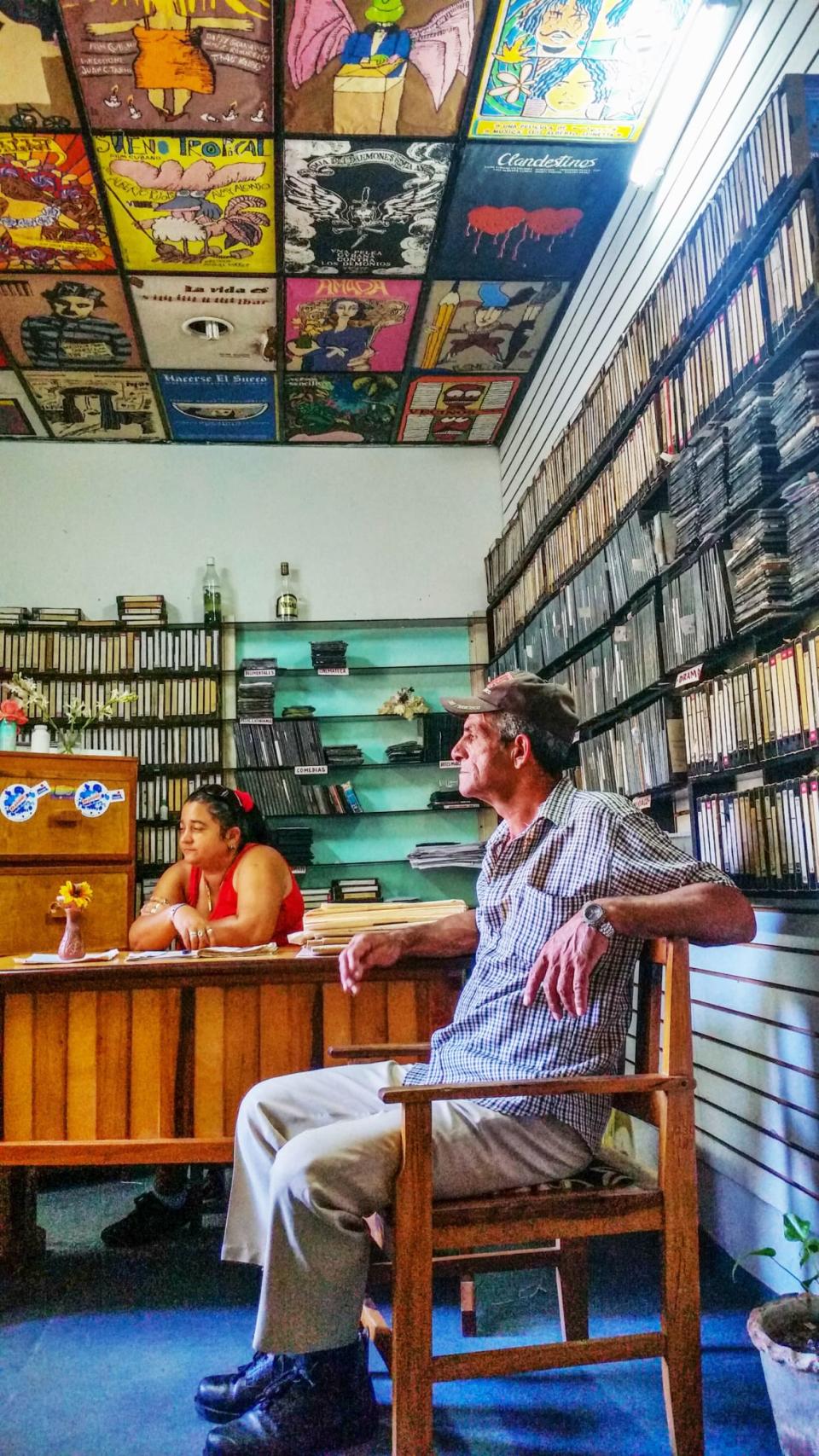
"Inside a Video Theater in Bayamo Cuba"
While solo bike touring Cuba in 2018, I found myself in Guantanamo with free time and legs in need of a day off. Fun fact: while Americans are most likely to associate Guantanamo with the controversial military base and detention center there, Guantanamo is a lush, beautiful province full of beaches, national parks, fantastic food, and indigenous music and dance. I found my way to Guantanamo’s main theater (which is usually on or near a city’s main square) and bought a ticket for Annihilation, a 2018 American horror flick. Fewer than five people joined me for the film.
For mere pennies, Cubans across the island can enjoy a day at the movies. It's so cheap that some locals pay the admission simply to enjoy the air conditioning, which seems to be more modern than some of the cinemas' technical equipment. In a country where many stores, restaurants, and hotels that cater to locals lack air conditioning, I’m consistently surprised and impressed with the strength and reliability of movie theater AC.
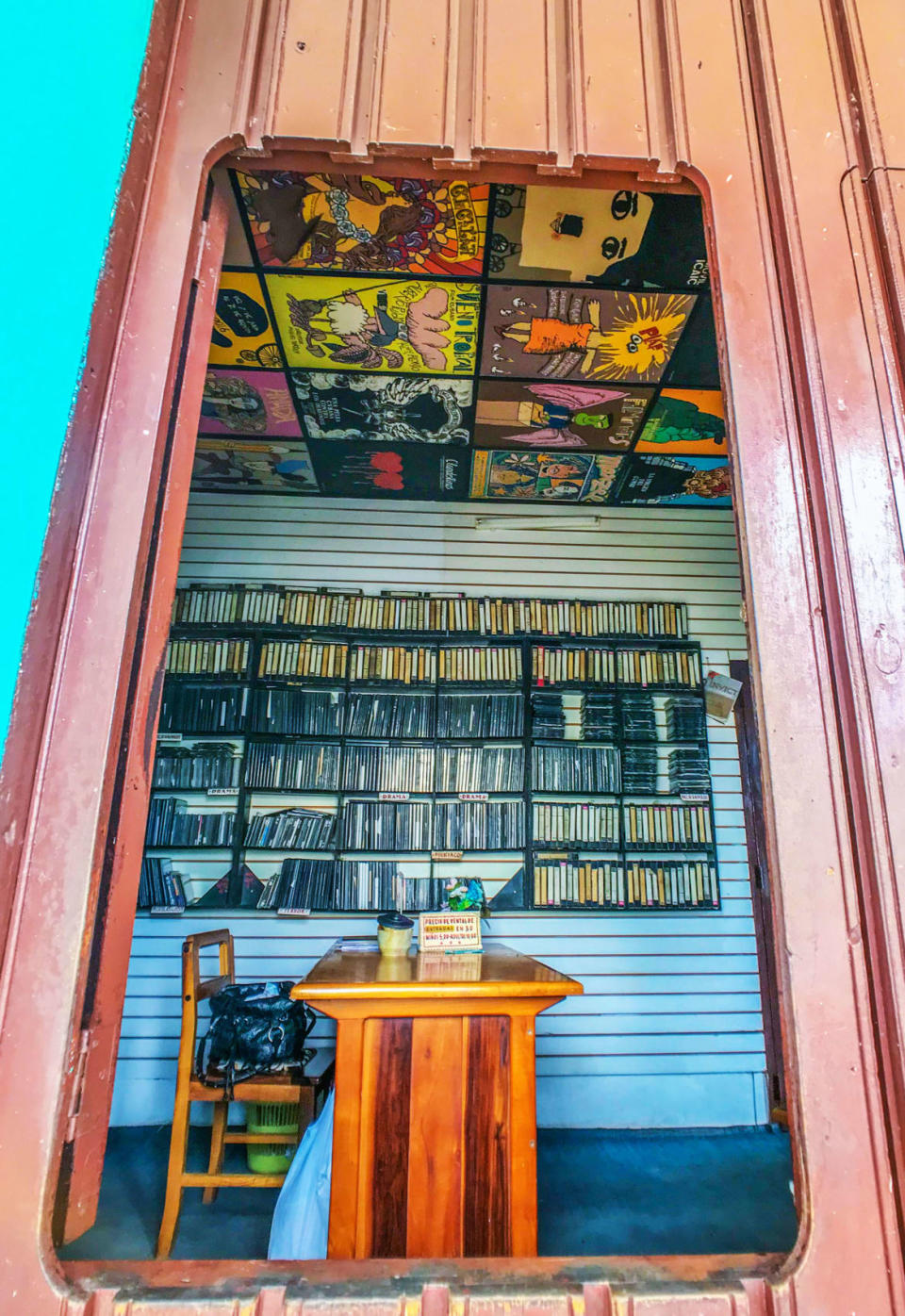
"DVDs and VHS for sale at a Video Theater in Bayamo Cuba."
While mainstream movies are becoming increasingly popular in Cuba, the country prides itself on hosting many international film festivals each year. One of the best film festivals in Cuba is the Latin American Film Festival in Havana, which takes place each December. Each spring, cinemas across Havana re-screen films from the festival. During the time I was leading a group tour in Havana in February 2019, the Cuban film Inocencia was all the rage and was being screened several times a day at virtually every theater in the city. It was even screened at festivals in the United States.
A lesser-known (to non-Cubans) Cuban film festival is Cine Pobre, held in Gibara, Holguín each April. This offbeat, somewhat makeshift week-long festival showcases Cuban and international films that have been produced on a small budget. My personal favorite from this festival is Rolling in Havana: Bicycle Stories, produced and directed by my good friend Jaime Santos-Menéndez. Cine Pobre has grown so much that in recent years, the government has allowed regular Cubans lacking rental licenses to rent out rooms in their homes to visitors (a practice that is strictly forbidden to homeowners that do not pay for a license to rent). Those who can’t find (or who can’t afford) a room sometimes camp on the beach or sleep in the park.
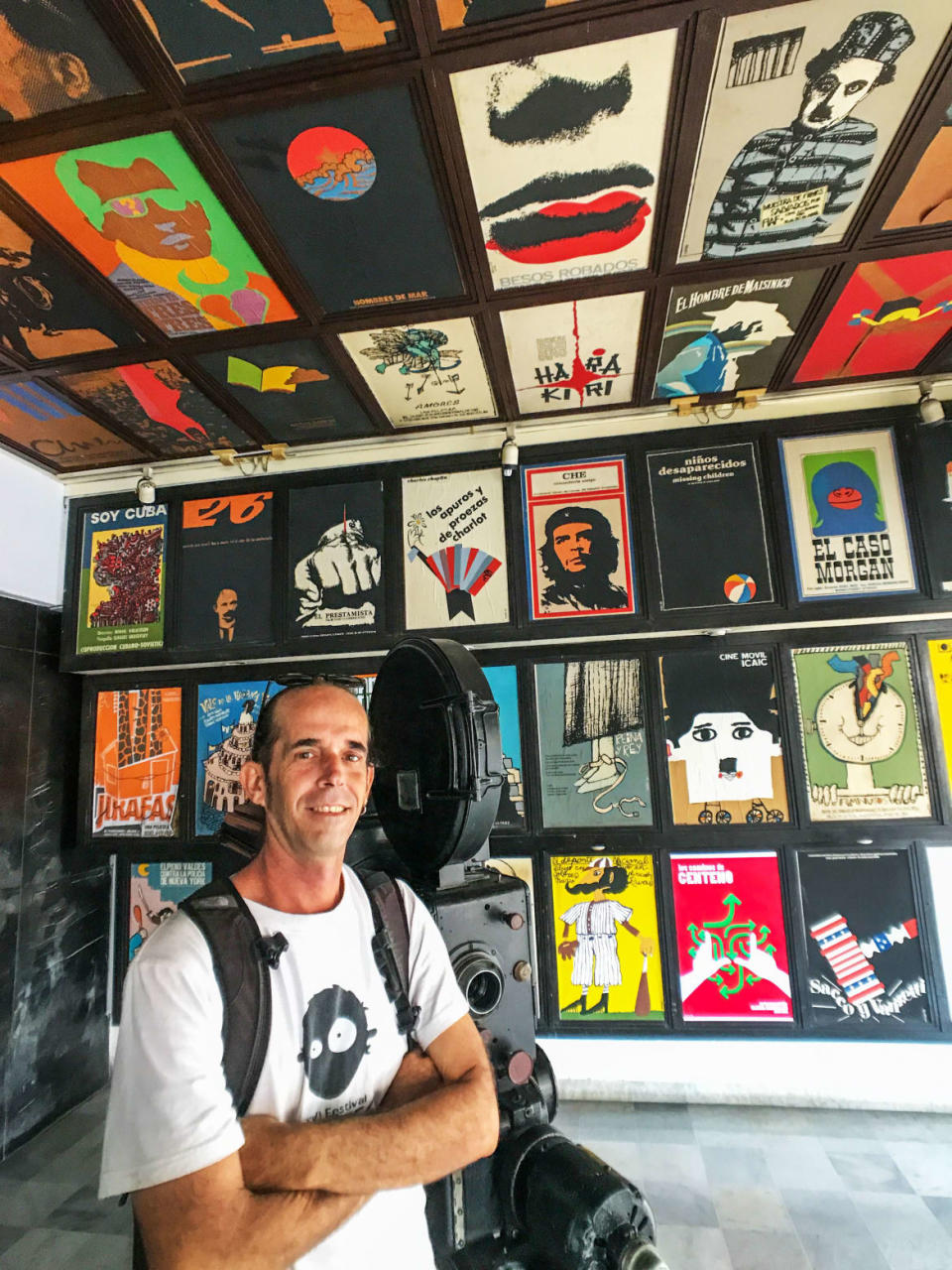
"Filmmaker Jaime Santos Menendez at Charlie Chaplin Theater in Havana."
What's most special to me about going to the movies in Cuba is not the incredible new Cuban-produced films or the intriguing foreign film festivals, and it’s definitely not the air conditioning. What continues to draw me to movie theaters across Cuba is the fact that they regularly screen Cuban films from the ’70s, ’80s, and ’90s, offering a glimpse of the rapidly-changing island's past. Not only are these films a part of the country’s history, but they are part of the collective memory and identity of Cubans themselves.
Because the films are screened so often and at such an affordable price (something that cannot be said in many countries), Cubans go to the movies frequently. They take pride in seeing locally-produced films on the big screen and occasionally, on a flat-screen TV (which can be found in many Cubans homes catering to tourists but which are still fairly uncommon). No matter where I go in the country, if I mention a classic Cuban film, everyone is familiar with it and is eager to discuss it with me.
Another treat to expect at Cuban movie theaters is the lack of advertising. Nobody is pushing you to enroll in a university, rent office and event space, or eat at a certain restaurant. You also won’t see any advertisements to buy popcorn and soda (there probably is no popcorn or soda to begin with) or reminders to silence your ringer. The down side is that you also won’t see any movie trailers for coming attractions.
Visitors to Havana should head to 23rd Avenue in the Vedado neighborhood, where they’ll have their pick of cines (theaters): La Rampa, Yara, Riviera, Charlie Chaplin, and 23 y 12 (conveniently located on the corner of 23rd Avenue and 12th Street). Cine Yara opened in 1947 and was operated by Warner Brothers. The name was changed from Teatro Warner Radiocentro to Cine Yara after the 1959 Cuban Revolution and is now considered to be one of the main theaters in Havana. Though it became one of the first Cuban cinemas to be equipped with digital projection in 2015, it retains its 35mm projector in order to screen classic films. In the evening, many Cuban cinemas, including Yara, double as concert and party venues. As movies tickets are so cheap (about 10 cents), movie theaters, virtually all of which are state-owned, are able to bring in additional revenue through the parties.
The lobby of the Charlie Chaplin theater in Havana is decorated with dozens of colorful posters from classic Cuban films and is worth a visit in its own right. According to my filmmaker friend Jaime Santos-Menéndez, the theater’s Dolby Digital sound is the best in the city. Across from the Chaplin is another small state-run cinema, Centro Cultural Fresa y Chocolate, the Strawberry and Chocolate Cultural Center, named after the 1993 film that sparked a national conversation about homosexuality. Fresa y Chocolate screens both independent and mainstream films and offers young, independent filmmakers an opportunity to showcase their films on the last Friday of each month. Each spring, they also host an independent film festival for filmmakers under the age of 35. In true socialist fashion, different categories exist for Cubans, foreigners, and foreigners who studied in Cuba or who made a film about Cuba. This way, international filmmakers with access to more funding and better equipment can’t win all the awards.
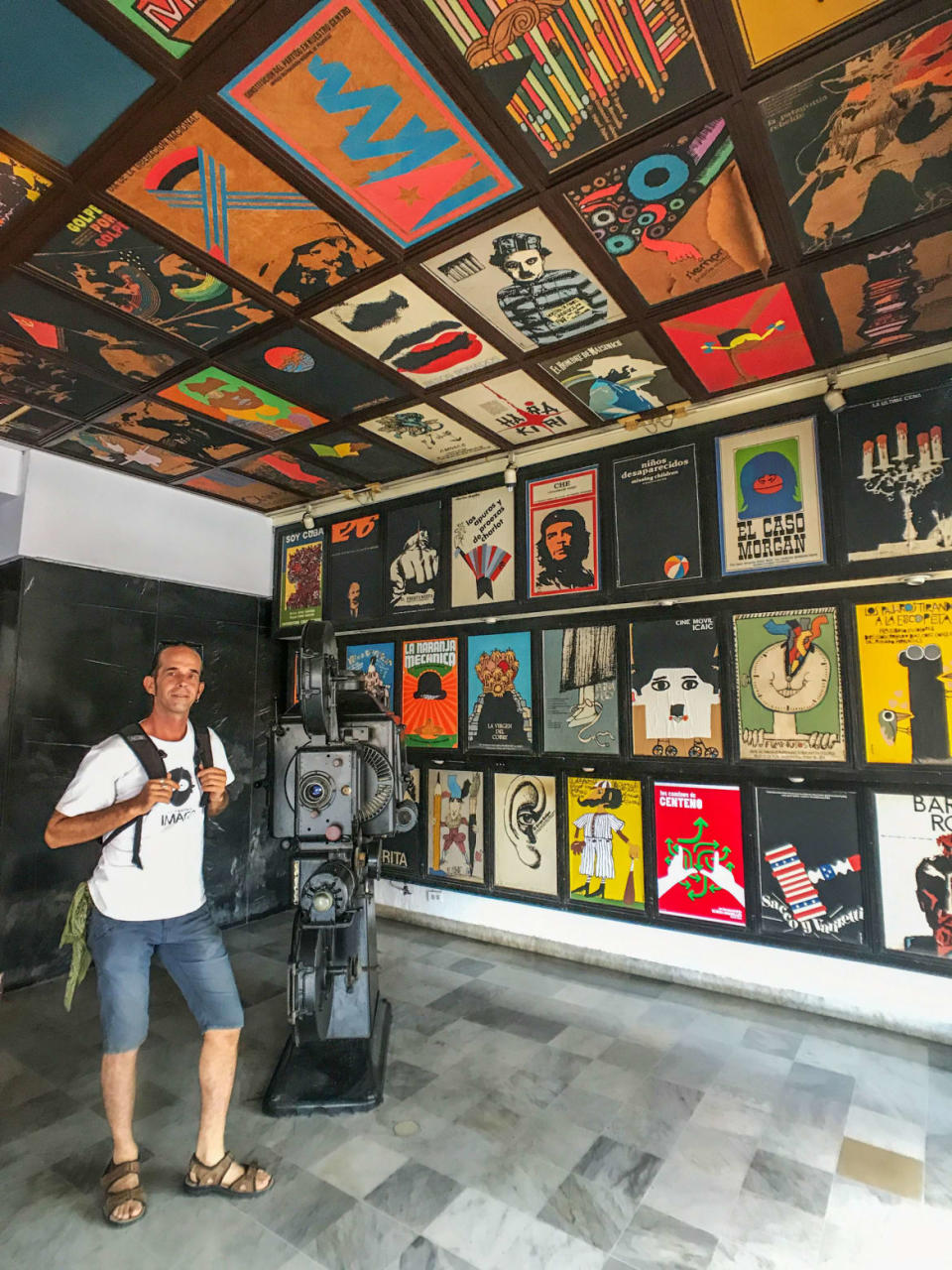
"Filmmaker Jaime Santos Menendez at Charlie Chaplin Theater in Havana."
One thing to know about going to the movies in Cuba is that even if you’re told there will be English subtitles, there likely won’t be. Movies are often dubbed in Spanish and so few tourists go to the movies that there’s no reason to provide subtitles. Don’t let this deter you. The charm of the theaters themselves, and the opportunity to see footage of life in Cuba that is unlikely to be screened outside the country, is reason enough to pop in. Some of these theaters even retain their original classic chairs and décor, further enhancing the experience.
Whether it’s a famous international film festival in Havana, a standard cinema night in Cienfuegos, or a video room screening in Bayamo, going to the movies in Cuba is an experience like no other. So, do yourself a favor when you visit Cuba, pull yourself away from the daiquiris long enough to spend an afternoon at the cinema. You won’t regret it.
Get our top stories in your inbox every day. Sign up now!
Daily Beast Membership: Beast Inside goes deeper on the stories that matter to you. Learn more.

